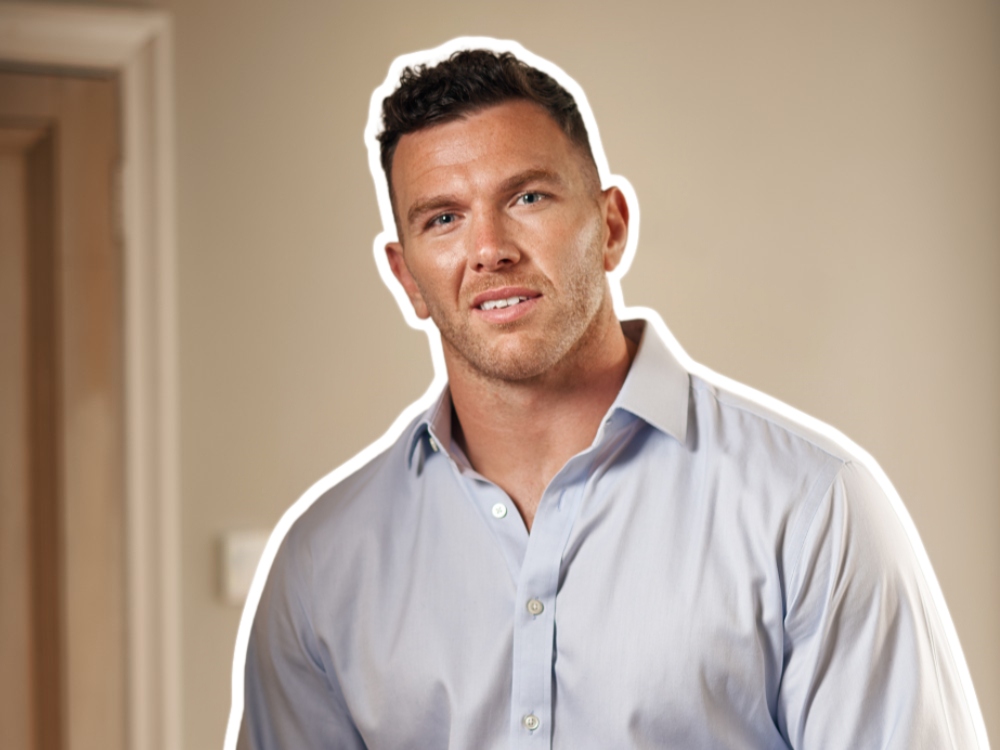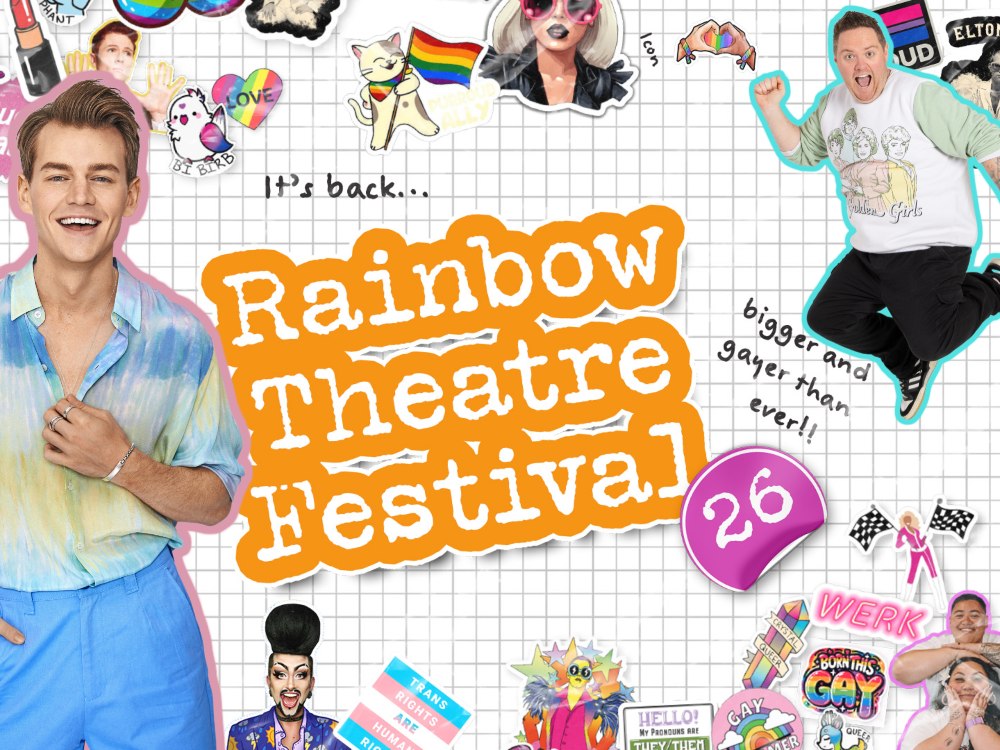Rugby league’s first openly gay player, Keegan Hirst, talks to Oliver Hall about coming out, coaching gay men, and confronting heart failure.
We speak in early August over Zoom from Keegan Hirst’s home in Devon, a perfect spot for Britain’s hot summer. The former professional rugby league player grins as he pans his laptop camera toward the window. “It’s nice,” he confirms, “very green and near the sea.”
For nearly two decades, Keegan’s life was defined by the bruising collisions of rugby league. Yet his story is more than tackles, tries, and trophies. It’s about survival, coming out under intense scrutiny, rebuilding after personal crisis, and most recently, facing a diagnosis that would shake even the toughest of athletes.
“I was at rock bottom”
Back in 2015, Keegan made headlines around the world when he became Britain’s first openly gay professional rugby league player. But behind that landmark moment was a story of deep struggle.
“To put it bluntly, I was at rock bottom,” he recalls. “My marriage had ended because I was drinking a lot, taking drugs, and I wasn’t in a good place at all because I was closeted… I’d hoped that my being gay, my sexuality, would change, go away, or that I’d be able to get over it.”
The pressure of hiding who he was pushed him to self-destruction. “I tried everything I could to be straight. I got married when I was 23. My daughter was born when I was 20, my son at 24. I was desperate not to be gay and really struggled with that, numbing myself with booze and drugs. That obviously had a massive impact on my relationship with my ex-wife, my children, my teammates.
“It got to the point where both of us agreed that this was not what we wanted our kids growing up thinking was a relationship. So we broke up. Just before that, I had been suicidal. I didn’t think coming out was an option, but I didn’t want to leave my kids. If I had committed suicide, no one would have known why because I hadn’t spoken to anybody about it, people would have blamed themselves, and I didn’t want that.”
After the separation, Keegan finally confronted his truth. “I got a bit of distance and perspective. I was able to sit and evaluate things, accept that I was gay, probably subconsciously I’d known for a long time, but I was desperate for it not to be true. I thought, What do I do with this information? Do I live in the closet? Do I tell people? Because I was at rock bottom, I just thought, What’s the worst that can happen? I’d love to tell you it was because I was brave and wanted to be a trailblazer, but it wasn’t, I just thought it couldn’t get any worse.”
The coming-out process began quietly. “I came out personally to my ex-wife first, then my mum, friends, teammates, and a few months later it became public.”
Going public
When the story did break, it wasn’t by his choice. “Word had filtered out among rugby teams,” he explains. “My coach at the time, John Kear, did a lot with the media and had been really supportive of me. I was captain at the time, so we spoke a lot anyway. He said the media had got hold of it and were going to run a story. His advice was to get out in front of it.”
In the middle of a divorce and raising two young kids, Keegan had to decide quickly. “The Sunday Mirror and The Sun both wanted to do it, I picked the Sunday Mirror because I thought it would be less salacious of the two.”
Advice for young queer athletes
To young LGBTQ+ athletes in New Zealand who might be struggling in traditionally masculine sports, Keegan advises, “Don’t do what I did, don’t bottle it up thinking it will go away.
“As with all challenges, it’s best to deal with them head on rather than sticking your head in the sand and hoping they disappear. Speak to somebody about it, someone you know, someone you can confide in, a family member, maybe even a coach. If you feel you don’t have those people around you, there are always helplines you can reach out to.”
Bottling it up, he says, poisoned his mental health. “We all catastrophise and think of the worst possible outcomes… None of that happened to me. In fact, my life is infinitely better now than it was when I was living inauthentically. It’s usually not as bad as we fear.”
Freedom on the field
Coming out didn’t just transform Keegan’s personal life, it improved his professional game as well.
“I played a hell of a lot better after I came out, Batley had our highest ever finish in the league. I think me coming out helped foster an environment where people felt they could be open and share things, we had players going through divorces, with drinking problems, gambling problems, and it brought us closer together. On paper, we weren’t a very good team, but that openness helped us play really well.”
The team’s success saw Keegan signed to play Super League, an achievement that highlighted his professional growth as a player.
Becoming a reluctant role model
For many, his decision to come out made him a trailblazer. But Keegan resists the label of “role model.”
“When people called me a role model after I came out, I thought, I have absolutely no idea what I’m doing. Coming out doesn’t mean you’ve got everything figured out, you still have internalised homophobia, shame, guilt, and other things to work through.
“There’s this idea that role models have everything sorted, are aspirational and inspirational, and never make mistakes, that’s not me. I wouldn’t feel comfortable pretending to be that. All I try to do is act in a way where I can look in the mirror and like the person I see.”
One last run
Though he officially retired from professional rugby league in 2020, Keegan returned for a season in 2023. “When COVID happened, my coaching business took off, and I started thinking maybe I didn’t need to get beaten up for a living,” he laughs, but one international news story left him feeling that he had unfinished business with rugby.
In 2022, seven Manly Sea Eagles players refused to wear rainbow-striped jerseys. The backlash reminded Keegan why visibility still matters.
“Sport mirrors society,” he says. “We’ve seen a huge backlash against trans people, and I worry that it won’t stop there and rights could be rolled back.”
So he returned to his hometown team, Batley.
“A couple of other teams had offered, but I only wanted to play for Batley. We got to the final at Wembley, which was a really nice way to finish my career.”
His time there and at Super League team Wakefield left him feeling hopeful for the next generation of players.
“I’d go on a night out and say, ‘I’m going to the gay bar,’ and the younger lads would want to come along. They were confident in their sexuality and didn’t see it as a threat to their masculinity,” he tells us, recalling how quickly attitudes shifted once teammates knew someone gay in their midst.
“Before I came out, I used to hear homophobic language in the changing rooms, but it wasn’t aimed at anyone, it was just poor vocabulary and a lack of education. Once I came out, I told people not to say it, and they’d apologise immediately. People were accommodating and accepting when faced with a real-life situation.
“So I hope that for younger athletes, they won’t have to wait until after their careers to come out, they’ll just come through as openly gay athletes, and it won’t be a big deal.”
Parenting openly
As an openly gay parent, Keegan’s greatest joy has been raising his kids in an environment of honesty. “My kids were 7 and 3 when I came out. I explained, ‘Daddy might have a girlfriend or a boyfriend,’ and that was that.
“My daughter understood straight away. My son took a bit longer, I’ve had to come out to him a few times over the years, but he gets it now. We have an incredible relationship. I’ve always been as honest as possible with what’s appropriate to share, and we talk openly about challenges. My son has dealt with homophobic bullying at school, but it hasn’t hindered our relationship at all, if anything, it’s strengthened it.”
Coaching, podcasts, and purpose
Today, much of Keegan’s work focuses on helping others. Alongside his partner, YouTuber Joel Wood, he co-hosts the Happy Healthy Homo podcast, now in its fifth season. The show explores representation, challenges assumptions about the gay community, and invites guests and listeners into conversations about living happier, healthier lives.
Keegan has also founded Gay Men’s Coaching, a holistic online coaching platform with clients from around the world, including a few based in Aotearoa. What started as personal training has grown into a full wellbeing service that combines nutrition, training, mindset work, and professional therapeutic support.
Working as a personal trainer with a lot of gay clients, Keegan started noticing patterns. “People trying to make themselves smaller, overly people-pleasing, tying their productivity and output to their worth.”
In Gay Men’s Coaching, Keegan wanted to offer the support he had needed when he was struggling, and the programme has seen remarkable results, from weight loss to career growth, from men coming out to finding partners and getting married.
For readers curious about joining, Keegan suggests starting with a message on Instagram or Facebook. He talks to every new client first, ensuring they’re a good fit for the community. From there, they receive one-on-one coaching, group calls, daily WhatsApp contact, and opportunities to join in-person events across the globe.
Living with heart failure
But just as life was settling into a new rhythm, in late 2024 Keegan was hit with a diagnosis that forced him to reassess everything.
After struggling during what should have been a routine jog, doctors discovered Keegan had dilated cardiomyopathy and heart failure. His heart’s ejection fraction had plummeted to just 20%, a fraction of the normal 60–80%.
“At first, I panicked,” he admits. “I made sure everything was sorted for the kids in case I died. Once that was done, I struggled with the loss of training, socialising, and a big part of my identity.”
It would have been easy to succumb to despair. But Keegan refused. “After a few months, I decided I didn’t want to be defined by the diagnosis. You have two options, curl up in a ball and let life happen to you, or take control where you can. I’d love to say I switched to that mindset straight away, but I didn’t. I had to work through it.
“Change doesn’t have to be bad, I decided to see what I could do and how I could adapt. Feeling sorry for myself wouldn’t change anything.”
From coming-out to his final match at Wembley, from podcasting to coaching gay men across the world, Keegan Hirst’s journey has always been about defying expectations, even his own. Now, his story is a reminder that even when life delivers blows heavier than any rugby tackle, it’s possible to stand back up.
































